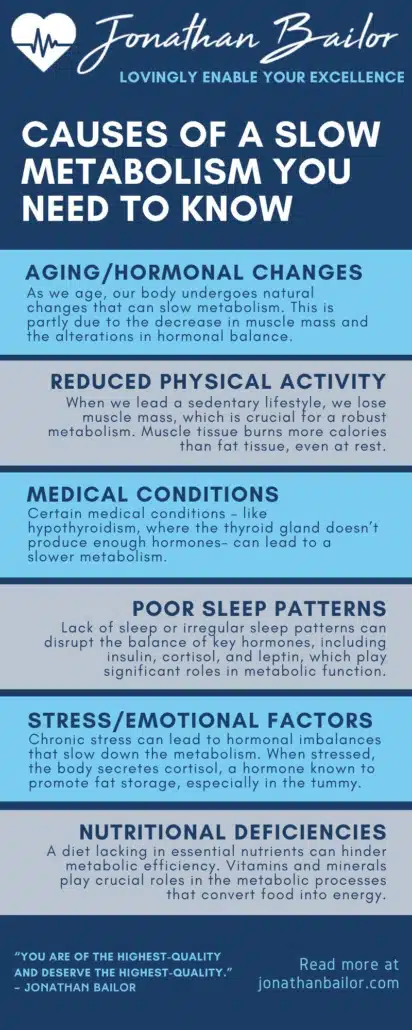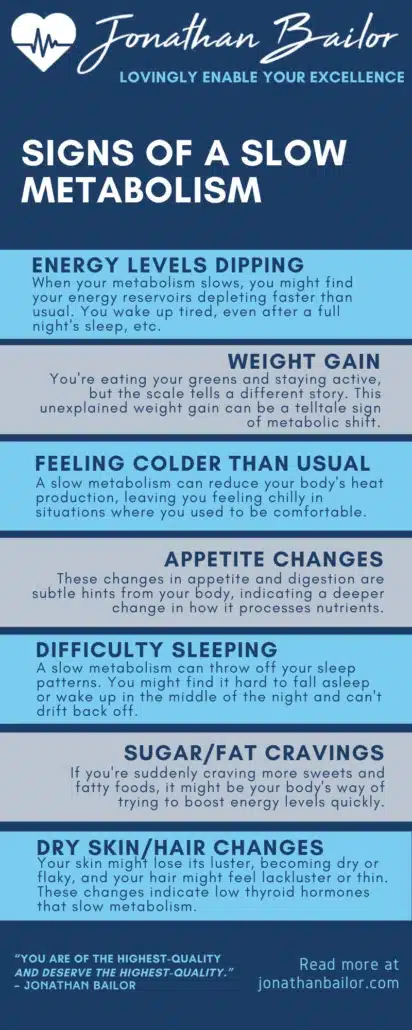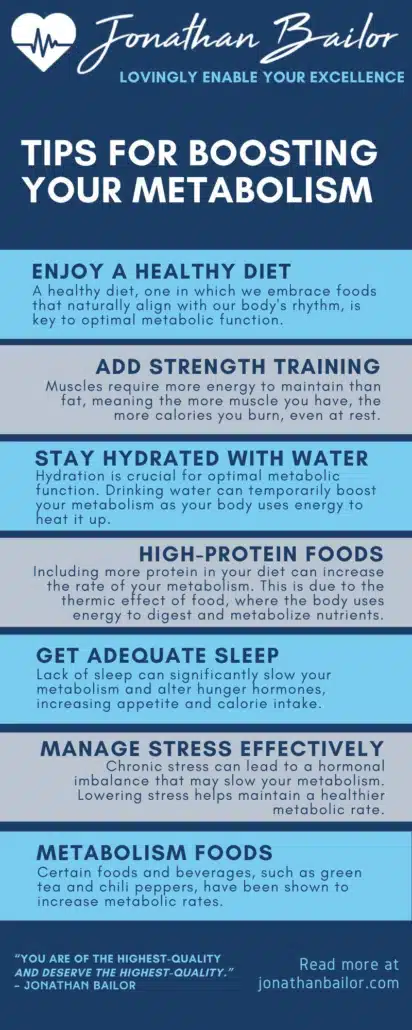8 Signs of Slow Metabolism and How to Speed it Up
Are you ready to take charge of your body’s internal engine? In this hormone health guide, Jonathan Bailor explores the vital aspects of the metabolism with expert tips on how to speed it up. If you like this article then make sure to check out our Ozempic guide (you don’t want to miss it!).
Have you ever felt that your body’s ‘engine’ isn’t revving as high as it used to? That’s your body’s metabolism talking, and sometimes it whispers a little softer as the years pass. Understanding this subtle language is key to nurturing your well-being, especially as we step into the wiser phases of our lives.
Metabolism, the unsung hero of our body’s daily functions, is often shrouded in mystery. It’s like a silent partner, working diligently behind the scenes, influencing everything from energy levels to how comfortably your favorite clothes fit. But what happens when this silent partner starts slowing down? Contrary to popular belief, a shifting metabolism isn’t an inevitable part of aging that we have to accept. There’s a lot we can do to rekindle its vitality.
In this enlightening exploration, we will uncover the subtle yet significant signs that might indicate your metabolism is taking a leisurely pace. These aren’t just random pointers but are grounded in a deep understanding of our bodies’ functions. They’re the kind of insights that make you pause and think, “That explains a lot!” And the best part? We’re not just identifying the signs but also offering practical, life-enhancing ways to address them.
Imagine having a guide that doesn’t just list symptoms but also lights the path forward with actionable steps. This isn’t about drastic changes or unattainable goals. It’s about simple, sustainable shifts that resonate with your lifestyle and can be integrated seamlessly into your daily routine. This is about empowering you to take control, to listen to your body’s messages, and to respond with care and wisdom.
Sharing this journey can be a beacon of hope and inspiration for your friends and family. Creating positive change in our communities is just as important as personal transformation on an individual level. By sharing this knowledge, you’re not just helping yourself; you’re potentially unlocking a new chapter of vitality for someone else. It’s about passing on a legacy of health, one thoughtful insight at a time.
So, let’s embark on this journey together. It’s time to tune in to your body’s signals and turn the page towards a more vibrant, energetic you. Let’s embrace this chapter of life with knowledge, grace, and a zest for living life to its fullest.
Unraveling the Mysteries: 6 Causes of a Slow Metabolism
Our body’s metabolic rate is like a flowing river, but its pace can vary based on several underlying factors. Understanding these factors is essential in navigating the journey towards maintaining a balanced and efficient metabolism. This exploration into the causes of a slowing metabolism is about peeling back layers to reveal the core influences that can alter our body’s natural rhythm. Each cause acts like a puzzle piece, fitting into the larger picture of our overall metabolic health.
Here are six key factors that can affect metabolism, causing it to slow:
1. Aging and Hormonal Changes
As we age, our body undergoes natural changes that can slow metabolism. This is partly due to the decrease in muscle mass and the alterations in hormonal balance. For instance, levels of hormones like estrogen and testosterone, which play a role in regulating metabolic rate, decline with age. This hormonal shift can lead to a slower metabolism, making it more challenging to maintain the same energy levels and weight as in younger years.
Understanding this natural progression allows us to adapt our lifestyle and dietary habits to support our changing bodies.
2. Reduced Physical Activity
Our bodies are designed to move, and a lack of physical activity can significantly slow down the metabolic rate. When we lead a sedentary lifestyle, we lose muscle mass, which is crucial for a robust metabolism. Muscle tissue burns more calories than fat tissue, even at rest. Therefore, decreased physical activity can lead to a reduced basal metabolic rate, making it easier to gain weight.
Regular exercise, especially strength training, can help maintain muscle mass and keep the metabolism active.
3. Underlying Medical Conditions
Certain medical conditions can directly or indirectly lead to a slower metabolism. Conditions such as hypothyroidism, where the thyroid gland doesn’t produce enough hormones, can significantly reduce metabolic rate. Similarly, conditions like Cushing’s syndrome or polycystic ovary syndrome (PCOS) can also affect the metabolism.
It’s important to consult healthcare professionals to identify and manage any underlying conditions that might be affecting metabolic health.
4. Poor Sleep Patterns
Quality sleep is crucial for a healthy metabolism. Lack of sleep or irregular sleep patterns can disrupt the balance of key hormones, including insulin, cortisol, and leptin, which play significant roles in metabolic function. Disrupted sleep can lead to increased hunger, cravings for high-calorie foods, and a decrease in energy expenditure.
Ensuring a regular sleep schedule and good sleep hygiene can support a healthy metabolism.
5. Stress and Emotional Factors
Chronic stress can lead to hormonal imbalances that slow down the metabolism. When stressed, the body secretes cortisol, a hormone known to promote fat storage, especially in the abdominal area. Additionally, stress often leads to emotional eating, further contributing to weight gain and a slower metabolism.
Managing stress through techniques like mindfulness, meditation, and regular physical activity can help mitigate its impact on the metabolism.
6. Nutritional Deficiencies
A diet lacking in essential nutrients can hinder metabolic efficiency. Vitamins and minerals play crucial roles in the metabolic processes that convert food into energy. For example, vitamin D, iron, and magnesium deficiencies can lead to a sluggish metabolism.
A well-rounded diet consisting of whole foods, fruits, vegetables, lean proteins, and healthy fats can provide the necessary nutrients to support a healthy metabolism.
Recognizing these causes offers a roadmap to understanding and managing our metabolic health. It’s not just about identifying the culprits but about building a lifestyle that harmonizes with our body’s needs, supporting a healthy and active metabolism through every stage of life.

Feeling Better Is Priceless, That's Why We Don't Put A Price On It!
“It’s Like A Free and Medically Valid Version of Noom and Weight Watchers Online”
~ Dr. Doctor Matthew Oleshiak, MD
Click the 'LEARN MORE' button below for free lifetime access to the fast fix program developed by Jonathan and top Ivy League Medical Doctors
LEARN MOREP.S. It's not a free trial. It's not part of the program for free. The entire program is free, forever, for real! No credit card needed.
Unveiling 8 Signs of a Slowing Metabolism
In the intricate dance of life, our metabolism plays a rhythm that dictates our energy, health, and overall vitality. As time marches on, this rhythm can subtly change, often unnoticed. It’s essential to recognize these changes not as mere footnotes of aging but as signals, inviting us to tune in and adapt.
The following eight signs are like gentle nudges, reminding us to listen to our bodies and respond with care. They’re not just markers; they’re opportunities for transformation and renewal.
1. Energy Levels Dipping
When your metabolism slows, you might find your energy reservoirs depleting faster than usual. You wake up tired, even after a full night’s sleep, and by the afternoon, you’re reaching for that extra cup of coffee. This isn’t just about feeling sleepy; it’s about deeper fatigue, where even small tasks feel demanding.
2. Weight Gain Despite Healthy Habits
You’re eating your greens and staying active, but the scale tells a different story. This unexplained weight gain, particularly around the waist, can be a telltale sign of a metabolic shift. It’s not just about calories in and out; it’s about how your body processes what you eat.
3. Feeling Colder Than Usual
If you’re constantly reaching for a sweater, even in mild weather, your metabolism might be cooling down. A slow metabolism can reduce your body’s heat production, leaving you feeling chilly in situations where you used to be comfortable.
4. Changes in Appetite and Digestion
Maybe you’re not as hungry as you used to be or feel full quicker. Or perhaps it’s the opposite, and you’re always hungry. Digestive issues like bloating or constipation can also signal a metabolic shift. These changes in appetite and digestion are subtle hints from your body, indicating a deeper change in how it processes nutrients.
5. Difficulty Sleeping or Insomnia
A slow metabolism can throw off your sleep patterns. You might find it hard to fall asleep or wake up in the middle of the night and can’t drift back off. Quality sleep is crucial for metabolic health, so disturbances here can create a cyclical impact.
6. Craving for Sugars and Fats
If you’re suddenly craving more sweets and fatty foods, it might be your body’s way of trying to boost energy levels quickly. This isn’t just about willpower but a metabolic need for quick energy sources.
7. Dry Skin and Hair Changes
Your skin might lose its luster, becoming dry or flaky, and your hair might feel lackluster or thin. These changes in skin and hair health can indicate low thyroid hormones that can slow metabolism, impacting how your body uses nutrients and maintains hydration.
8. Muscle Weakness or Loss
If climbing stairs or carrying groceries feels harder than before, it could be a decline in muscle strength, a common companion of a slowing metabolism. This isn’t just about aging muscles; it’s about changes in how your body maintains and builds muscle tissue.
9. Longer Recovery Time After Exercise
You might notice it takes longer to recover after a workout, with soreness lingering for days. This prolonged recovery period can be a clue that your metabolic rate isn’t what it used to be, affecting how quickly your body repairs and rejuvenates itself.
Recognizing these signs is the first step in a journey toward metabolic rejuvenation and optimal health. It’s about creating harmony between lifestyle choices and the body’s evolving needs. This list is more than just observations; it’s a guide, a path to understanding and responding to the messages our bodies send us as we navigate the ebbs and flows of life.

Igniting Vitality: 7 Effective Strategies to Boost Your Metabolism
The quest to enhance our metabolism is akin to nurturing a garden; it requires patience, care, and the right environment to flourish. Boosting metabolism isn’t about quick fixes but cultivating habits that foster sustained vitality.
The following strategies offer practical, scientifically-backed ways to invigorate your metabolic rate and enjoy sustainable weight loss. These methods aren’t just random tips; they’re thoughtfully crafted to integrate into your lifestyle, supporting a journey toward a more energetic and vibrant self. Each approach is a stepping stone towards harmonizing your body’s natural processes, whether your goal is losing weight or having more energy.
1. Enjoy a Healthy Diet
A healthy diet, one in which we embrace foods that naturally align with our body’s rhythm, is key to optimal metabolic function. This dietary approach emphasizes whole, nutrient-dense foods—a colorful array of nonstarchy vegetables along with low-sugar fruits—healthy whole-food fats found in foods like nuts and seeds—and nutrient-dense proteins. These healthy foods also help regulate blood sugar, making burning fat and losing weight easier.
The key is not just in what we eat but also in how these choices synergize with our body’s inherent processes, supporting a stable, healthy body weight and a vibrant, energetic life. This way of eating is more than a diet; it’s a harmonious lifestyle choice that nurtures our body’s natural balance.
2. Incorporate Strength Training into Your Routine
Muscle mass is a key player in maintaining a healthy metabolism. Strength training, such as lifting weights or bodyweight exercises, helps build muscle mass, which in turn can boost your metabolic rate and help you lose weight. Muscles require more energy to maintain than fat, meaning the more muscle you have, the more calories you burn, even at rest.
This doesn’t mean you need to become a bodybuilder; incorporating strength training exercises two to three times a week can significantly impact your metabolism.
3. Stay Hydrated with Water
Hydration is crucial for optimal metabolic function. Drinking water can temporarily boost your metabolism as your body uses energy to heat it up. Drinking around 17 ounces of water can boost your metabolic rate by as much as 30% for around an hour. Keeping hydrated also supports overall health and can help you feel full, potentially aiding in weight management.
4. Prioritize High-Protein Foods
Including more protein in your diet can increase the rate of your metabolism. This is due to the thermic effect of food, where the body uses energy to digest and metabolize nutrients. Protein causes the largest rise in the thermic effect, increasing your metabolic rate by about 15-30%. Besides, protein consumption can also lead to a feeling of fullness, reducing overall calorie intake.
5. Get Adequate Sleep
Lack of sleep can significantly slow your metabolism and alter hunger hormones, increasing appetite and calorie intake. Ensuring you get sufficient, high-quality sleep each night is essential for maintaining a healthy metabolic rate.
Try to get 7-9 hours of uninterrupted sleep and practice good sleep hygiene, like reducing screen time before bed and maintaining a regular sleep schedule.
6. Manage Stress Effectively
Chronic stress can lead to a hormonal imbalance that may slow your metabolism. Stress management techniques like yoga, meditation, and deep breathing exercises can help regulate the stress hormone cortisol.
By managing stress, you can maintain a healthier metabolic rate and improve your overall well-being.
7. Consume Metabolism-Boosting Foods and Beverages
Certain foods and beverages have been shown to increase metabolic rates. These include green tea, which contains catechins that can boost metabolism, and chili peppers, which contain capsaicin that can increase the number of calories you burn. Incorporating these into your diet in moderation can provide a natural boost to your metabolism.
Embracing these strategies is about creating a synergy between your body’s needs and your daily habits. Each method is a tool to elevate your metabolic rate, leading to a more energized and rejuvenated self. Remember, boosting your metabolism is a journey of small, consistent steps that lead to significant, lasting impacts.

Harmonizing with Hormones: Your Questions Answered
In the complex web of bodily functions, hormones act as conductors of a symphony. They orchestrate a multitude of biological processes, from growth and metabolism to mood regulation. Understanding hormones is key to achieving a harmonious balance within our bodies.
Here are some frequently asked questions about hormone health, offering insights to help you navigate this complex yet fascinating aspect of your well-being.
Q1: What are the most common signs of a hormonal imbalance?
A1: Signs of hormonal imbalance can manifest in various ways, depending on which hormones are affected. Common symptoms include unexplained weight gain or weight loss, inability to lose weight, persistent fatigue, sleep disturbances, mood swings, and changes in appetite. Women may experience irregular menstrual cycles, while men might notice decreased libido or erectile dysfunction.
It’s important to note that other health issues can also cause these symptoms, so consulting a healthcare professional for an accurate diagnosis is essential.
Q2: How can diet affect hormone health?
A2: Diet plays a crucial role in maintaining hormonal balance. A balanced diet rich in whole foods, fruits, vegetables, lean proteins, and healthy fats provides the necessary nutrients for hormone production and regulation. Avoiding excessive sugar and processed foods is also essential, as they can disrupt insulin levels and lead to hormonal imbalances. Including foods rich in omega-3 fatty acids, like fish and flaxseeds, can also support hormone health.
Q3: Can stress impact hormone levels?
A3: Yes, chronic stress can significantly impact hormone levels. Stress triggers the release of cortisol, the body’s primary stress hormone. Prolonged high levels of cortisol can disrupt the balance of other hormones, such as insulin, estrogen, and testosterone, leading to various health issues.
Managing stress through relaxation techniques, adequate sleep, and physical activity can help maintain hormonal balance.
Q4: Are there natural ways to boost hormone health?
A4: Natural ways to support hormone health include maintaining a healthy weight, engaging in regular physical activity, and getting enough sleep. Certain herbs and supplements, like ashwagandha and vitamin D, may also support hormone health, but it’s essential to consult a healthcare professional before starting any new supplement. Reducing exposure to endocrine disruptors, chemicals that can interfere with hormone functions, is also beneficial.
Q5: How does aging affect hormone levels?
A5: Hormone levels naturally change as we age. For women, menopause brings a significant decrease in estrogen and progesterone levels, while men experience a gradual decline in testosterone levels, known as andropause. These changes can lead to symptoms like hot flashes, decreased bone density, and changes in mood and energy levels. Adopting a healthy lifestyle can help mitigate some of these age-related hormonal changes.
Navigating the world of hormone health is a journey of understanding and adapting to your body’s needs. Each question and answer sheds light on the crucial role hormones play in our overall health and well-being.
Remember, achieving hormonal balance is key to a more vibrant and energetic life.
Embracing Metabolic Harmony: A Journey to Share
In our journey through the nuances of metabolism, we’ve uncovered insights that transcend mere knowledge, weaving into the fabric of our daily lives. This exploration is more than individual enlightenment; it’s a beacon to guide others.
Share these revelations with friends and family via social media platforms and email. Let this knowledge ripple out, touching lives, sparking conversations, and kindling a collective quest for health and vitality. Let’s embark on a path of metabolic harmony, embracing a future of energy, balance, and well-being. Your sharing can light the way for many, igniting a community-wide transformation.
Feeling Better Is Priceless, That's Why We Don't Put A Price On It!
“It’s Like A Free and Medically Valid Version of Noom and Weight Watchers Online”
~ Dr. Doctor Matthew Oleshiak, MD
Click the 'LEARN MORE' button below for free lifetime access to the fast fix program developed by Jonathan and top Ivy League Medical Doctors
LEARN MOREP.S. It's not a free trial. It's not part of the program for free. The entire program is free, forever, for real! No credit card needed.




